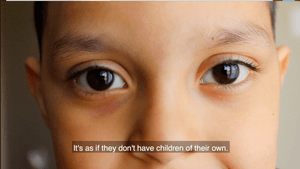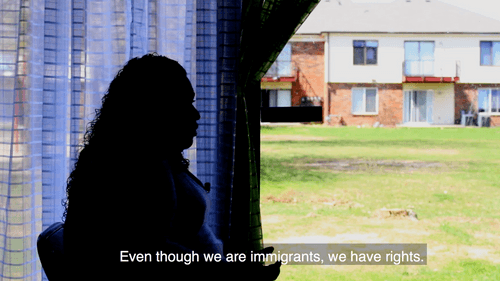It’s happening here
Michelle Angela Ortiz’s ‘Las Madres de Berks’

In Michelle Angela Ortiz’s new film, Las Madres de Berks, you can’t avoid the eyes.
A child’s eyes, wide burnt-sienna pools, monopolize the screen, while a mother’s voice says bitterly, “It’s as if they don’t have kids of their own… as if we are nothing to them.” The eyes of a Salvadoran woman barely blink as she describes being held with her six-year-old son in a prison just 60 miles from Pennsylvania’s capital.
In this terse, wish-it-were-longer documentary, part of Ortiz’s Familias Separadas project, the filmmaker forces us to confront the human cost of detaining families—typically mothers with young children—for periods as long as two years.
Not happening far away
Ortiz interviewed and worked with 14 families, 10 of which were ultimately deported; four were released and continue fighting against possible deportation. In creating the film, along with temporary and permanent art installations, Ortiz hopes to provoke empathy and action, a spur to shut down the Berks County Residential Center, established in 2001 and one of three prisons that house immigrant families in the United States.
“This is not happening far away from us,” Ortiz told the audience at a June 2 screening at University of the Arts. “This issue begins at the border and spreads throughout the nation. The intention of the film is to have [the women] speak for themselves.”
When they do—sometimes filmed in shadow or from behind, faces hidden, their voices tightly controlled or cracking with grief—their words indict a federal administration that has called immigrants “criminals” and “animals.”
Lorena, Sofia, and Karen
Lorena, from Honduras, was detained for 663 days with her three-year-old son. Sofia recounts praying during her 648-day detention with her 14-year-old son. The mothers tell of not being permitted to sleep with their children, of long delays for medical treatment, of their children’s anguish and questions.
Karen, the woman from El Salvador who spent 651 days at Berks with her son before being deported, describes the trauma of detention. “He told me he was going to hang himself, throw himself out the window, if he couldn’t leave.” Once back in El Salvador, Karen insisted that Ortiz’s crew film her at the home of a friend; her own neighborhood, she said, was too dangerous.
“Put yourself in my shoes,” Karen urges in the film. ‘What if your son asked, ‘Mom, why can’t I be free?’”
The only one who gives me strength
It was Karen’s eyes—an expression of grief and reproach—that Ortiz magnified, replicated, and plastered onto the State Capitol Building steps in an 88-foot mural last November, in conjunction with a statewide pre-election protest organized by the Shut Down Berks Coalition.

Other artworks in Familias Separadas, featuring images and quotes from the women Ortiz interviewed, appeared on billboards, bus-shelter posters, and walls around Harrisburg. A permanent mural in the Allison Hill neighborhood includes a quote from Delmy, a mother who died last December: “Mi hijo es el unico que me da fuerza.” My son is the only one who gives me strength.
Still open
In February 2016, after reviewing a litany of human rights abuses at Berks, the Pennsylvania Department of Human Services decided not to renew the facility’s license. Officials from Berks County, which runs the center, appealed; the licensing case continues to crawl through the legal bureaucracy. That’s why the Shut Down Berks Coalition is calling for Governor Tom Wolf to issue an emergency removal order, which would end family detentions at the facility while the appeal case continues.
The documentary is effective art-as-advocacy. It unfolds in linear fashion, without fancy film tricks or heavyhanded framing. There’s no need; the women’s stories speak poignantly for themselves, an essential counternarrative to the Trump administration’s continued war of words and policy against immigrants.
With the Shut Down Berks Coalition as a community partner, Ortiz plans free screenings of Las Madres de Berks in other Pennsylvania locations, including the public library in Lancaster, the Susquehanna Art Museum, and the University of Pittsburgh.
“Never give up”
In a Q&A following Saturday’s showing at UArts, Ortiz and Jasmine Rivera of the Shut Down Berks Coalition underscored that the detainment of immigrant families is just one facet of the mass incarceration of people—most of them black- and brown-skinned—in the US, and that shuttering Berks is one effort in the movement for total prison abolition.
During their detentions, the mothers organized labor and hunger strikes, actions that ended only when detention officials threatened to remove their children. Once released, the women were required to wear electronic monitoring bracelets and endure periodic visits from ICE.
With Ortiz’s prompting, they composed letters to their children—testaments of survival and hope. “Be a dreamer,” Karen wrote to her despondent son, “so that you can reach your goals. Never give up. Because I never did.”
What, When, Where
See screenings of Las Madres de Berks on Saturday, July 20, 2019, at 3pm at the Lancaster Public Library (25 N. Duke Street, Lancaster, PA); or on Sunday, July 21, at 5:30pm at Susquehanna Art Museum (1401 N. 3rd Street, Harrisburg, PA).
Sign up for our newsletter
All of the week's new articles, all in one place. Sign up for the free weekly BSR newsletters, and don't miss a conversation.

 Anndee Hochman
Anndee Hochman